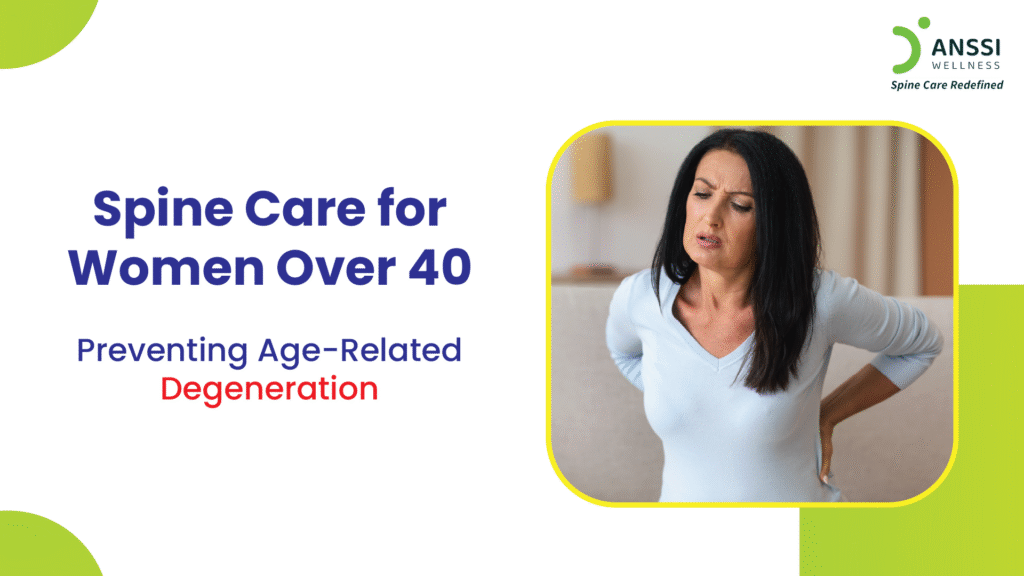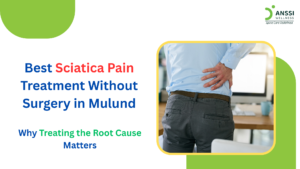Turning 40 is often seen as a milestone: a time to focus on health, well-being, and long-term vitality. For women, this stage often coincides with perimenopause and menopause, when hormonal changes bring new challenges to the body, including the spine. Age-related degeneration of spinal discs and joints becomes more common, leading to stiffness, discomfort, or chronic back pain. But the good news is that with proactive care, women can maintain strong, flexible, and healthy spines well into later years.
Understanding Age-Related Spine Changes
The spine naturally undergoes wear and tear with age. Spinal discs, which act as cushions between vertebrae, lose hydration and elasticity over time, making them prone to thinning, bulging or herniation. Joints in the spine may also develop arthritis, causing stiffness and reduced mobility.
For women, reduced estrogen levels during perimenopause and menopause accelerate bone density loss, increasing the risk of osteoporosis and spinal fractures. Hormonal changes also affect muscles and ligaments, contributing to postural changes and discomfort. Without preventive care, these factors can lead to chronic pain and limited independence.
Lifestyle Strategies for Spine Health
Nutrition
A nutrient-rich diet is essential for spine and bone health. Women over 40 should prioritize calcium, vitamin D, and magnesium to maintain bone density. Antioxidants from fruits and vegetables reduce inflammation, while protein supports muscle strength to stabilize the spine.
Exercise
Staying active is one of the most effective ways to slow spinal degeneration. Core-strengthening exercises like Pilates and yoga improve stability, while weight-bearing activities such as walking and light strength training protect bone health. Regular stretching maintains flexibility and prevents stiffness.
Posture
Poor posture accelerates spinal degeneration. Simple habits, like keeping screens at eye level, adjusting chairs for lumbar support, and standing tall, can reduce strain on the back and neck. Women who spend long hours sitting should make it a point to stand, stretch, and move frequently throughout the day.
Preventive Health Measures
- Screenings: Regular bone density tests and spine health check-ups are critical after 40. Early detection of osteoporosis or disc issues allows for timely intervention.
- Hydration: Spinal discs depend on water to maintain cushioning and elasticity. Drinking enough water throughout the day supports disc rehydration, reducing stiffness and pain.
- Weight Management: Excess weight places additional stress on the spine and accelerates disc degeneration. Maintaining a healthy weight through balanced eating and regular exercise reduces the overall spinal load.
Non-Surgical Care Options
Sometimes, despite lifestyle improvements, women experience chronic back or neck pain. Non-surgical treatments can provide effective relief while avoiding the risks of invasive procedures.
- Physiotherapy helps improve posture, mobility, and muscle strength. Targeted exercises support spinal alignment and reduce pain.
- Non-Surgical Spinal Decompression Treatment is a modern, safe treatment that gently stretches the spine to relieve pressure on discs and nerves. This promotes healing and prevents further degeneration without drugs, injections, or surgery.
- Complementary Therapies such as stretching routines, massage therapy, and stress management practices like meditation can ease tension and improve overall well-being.
About ANSSI:
ANSSI Wellness focuses on improving the quality of life for patients suffering from spinal issues, aiming to provide relief where other conventional treatments have failed. Through advanced Non-Surgical Spinal Decompression Treatment, ANSSI is committed to helping patients avoid surgery and recover in a safe, effective, and compassionate environment.
Connect with ANSSI Wellness on LinkedIn, Instagram, and Facebook for expert guidance.




